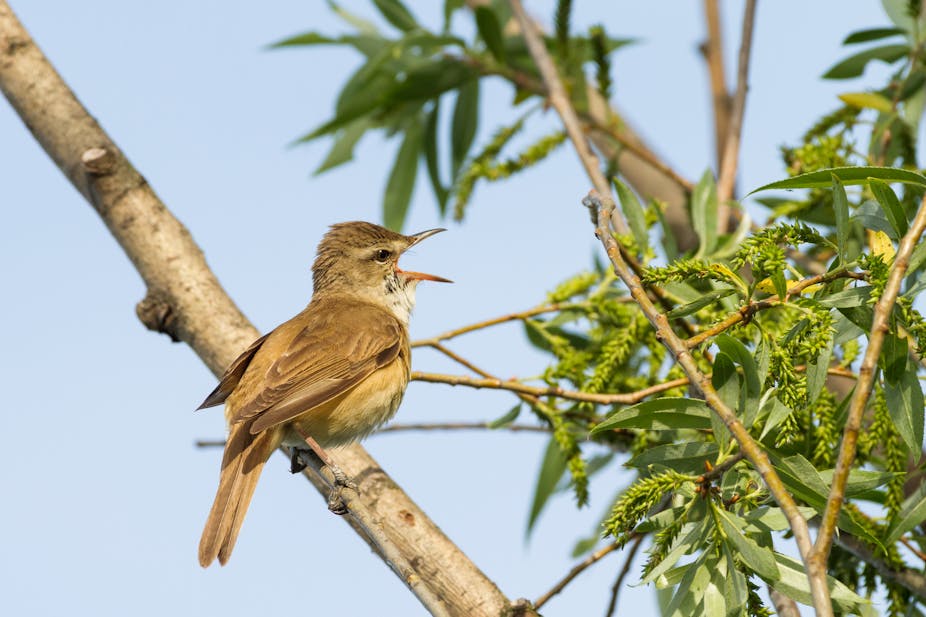Bird song has fascinated scientists for decades. Songs can be intricate, loud and, as it turns out, very important for reproductive success. In many species the males with the most complex songs secure the highest quality breeding territories and mates, and end up producing the most young. For species that spend their summers in Europe, almost every hour of daylight is crammed full with energetic and often very loud song.
For songbirds that have migrated to Africa at the end of the breeding season, singing shouldn’t be on their to-do list. Singing requires a big energetic investment and increases vulnerability to predators. The only time males should be willing to pay these costs is when there is a good chance of attracting females as mates, and that is not going to happen in Africa outside of the breeding season.
Despite this, several species of migratory songbirds, from Wood Warblers to Nightingales, are known to sing a great deal in Africa. This prompted us to ask: what is the purpose of singing in Africa, when the breeding grounds are thousands of kilometres away? To answer this question, we focused on a drab-looking but raucous singer, the Great Reed Warbler. This species breeds in Europe and spends the northern winter in the wet grasslands and savannahs of sub-Saharan Africa.
Testing a long-held hypothesis
We began by testing a long-held hypothesis for the persistence of singing in Africa. Perhaps singing is being used as a means to defend individual winter-feeding territories. It might be acting as a “keep out” sign to other individuals encroaching on the territory holder’s space.
In territorial systems, distinct boundaries are expected between the spaces used by each individual in combination with an aggressive reaction when that territorial boundary is breached. We used radio transmitters to track bird movements through the tall grasses of the study site in Zambia, and used models of Great Reed Warblers with recorded song to simulate territory intrusions. We found no support for the expectations of territoriality. Great Reed Warblers overlapped widely in their use of space, and individuals were unperturbed by other birds in their space.

Given that Great Reed Warblers did not have a territorial system, this long-held hypothesis of singing for territorial protection didn’t hold up.
Singing for song improvement
Next, we tackled an intriguing but yet untested hypothesis. Perhaps, given the importance of song quality for males during breeding, they were using their downtime in Africa to improve the quality of their songs.
To find out, we combed through the literature and spoke to other researchers in Africa to determine which of the 57 migratory songbird species that migrate from Europe sing while in Africa and, importantly, how much. If this hypothesis is true, the benefits of singing in Africa should be most important for species in which song is especially valued when choosing a mate. Those should be species with the most complex songs, but conversely with the dullest appearance. So, when males are drab, females are expected to pay more attention to flashy song rather than flashy plumage.
Sure enough, we found that species with more complex songs, and those with drab plumage colouration, sing most often when in Africa. We argue that the costs associated with practice are probably well worth the investment for those species that stand to benefit most from producing the highest-quality songs.
A final piece of evidence comes from the Great Reed Warblers themselves. If songs function to defend territories, then they should sing the short territorial warnings they use to defend their breeding territories. But instead, recordings from Zambia showed that African songs are much more like those sung during mate attraction on the breeding grounds, when attracting a female is paramount. But there are a couple of important differences.
In Africa, songs are much longer and with many more switches between syllables than those sung in Europe. Given that songs in Africa are sung without a female receiver in mind, this may be the best way to practice. In Europe, when songs are mixed amongst the racket from competing males, repeating complex syllables up to five times is important to ensure that they are received loud and clear by females.
With the evidence tallied, both from Great Reed Warblers and across the dozens of songbird species that migrate between Africa and Europe, this puzzling non-breeding singing behaviour appears best explained as a rehearsal period before the big show the following spring.
To conclusively test this hypothesis, researchers would need to follow individual birds between their breeding and non-breeding grounds and monitor changes to their song and their breeding success. But this is close to impossible given the current tracking devices available. For now, this study points towards an intriguing new explanation for this previously unstudied behaviour. It also offers insight into the lives of migratory songbirds during the lengthy, but little-known part of their lives spent in Africa.

